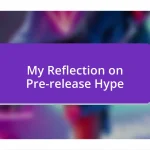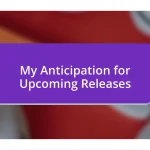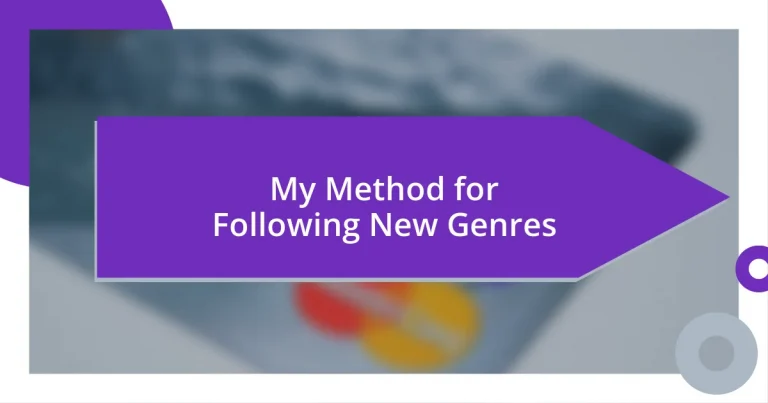Key takeaways:
- Understanding and exploring new genres enriches reading experiences and broadens cultural understanding.
- Identifying personal preferences and actively researching genre characteristics enhances enjoyment and discovery of new favorites.
- Engaging with genre communities fosters deeper insights and recommendations, opening pathways to books that may otherwise go unnoticed.
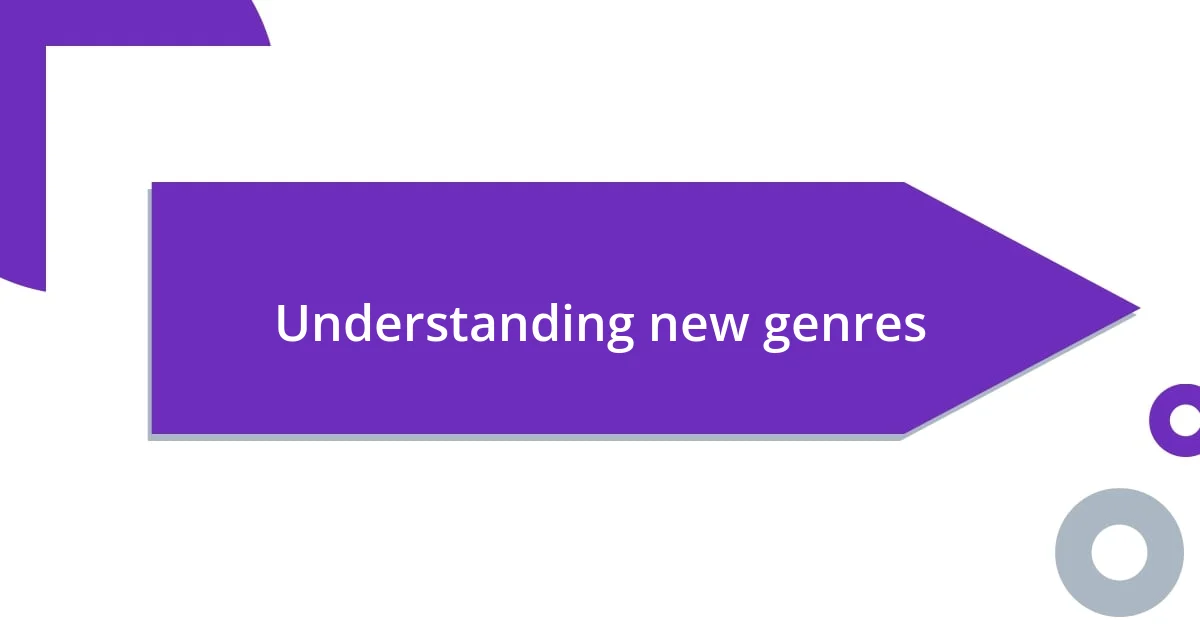
Understanding new genres
Understanding new genres can feel like stepping into uncharted territory. I remember the first time I tried to dive into magical realism. The blending of the fantastical with the mundane left me both bewildered and intrigued. Have you ever felt that rush of excitement when discovering a book that defies your expectations? It’s like finding a hidden gem that speaks directly to your imagination.
Genres are not just labels; they’re pathways to new experiences. For instance, my encounter with the graphic novel genre completely shifted my perspective on storytelling. The combination of visual art and narrative allowed me to explore complex themes in a way that traditional prose could not. Isn’t it fascinating how a simple shift in format can unleash such a wealth of emotions?
As I continue to navigate new genres, I often find myself reflecting on what draws me to them. Is it the fresh perspectives they offer, or perhaps the challenge of recalibrating my expectations? Each new genre invites exploration, pushing the boundaries of what I thought I knew about storytelling. By engaging with diverse genres, we enrich not only our reading experience but also our understanding of different cultures and ideas.
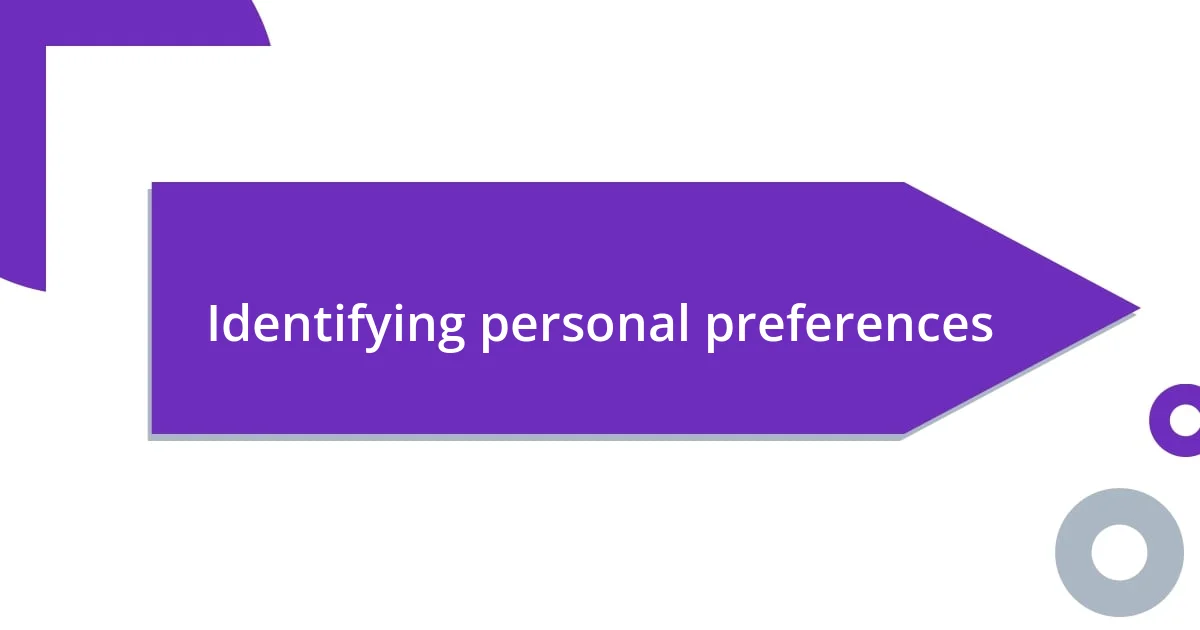
Identifying personal preferences
Identifying personal preferences is a crucial step in enjoying and navigating new genres. I’ve found that paying attention to the themes and styles that resonate with me often leads to delightful discoveries. For example, my aversion to overly complex narratives made me gravitate towards genre fiction that strikes a balance between depth and readability, like cozy mysteries, where I can savor the story without feeling overwhelmed. This approach keeps my reading experience enjoyable and enriching.
To better understand your own preferences, consider the following questions:
- What themes consistently attract you? (e.g., adventure, romance, science fiction)
- Do you prefer a fast-paced plot or a more contemplative narrative?
- Are you drawn to character-driven stories or intricate world-building?
- How does the writing style impact your enjoyment of the genre?
- What emotions do you seek when choosing a book (e.g., excitement, nostalgia, inspiration)?
By reflecting on these aspects, you can fine-tune your genre exploration and discover new favorites tailored to your tastes.
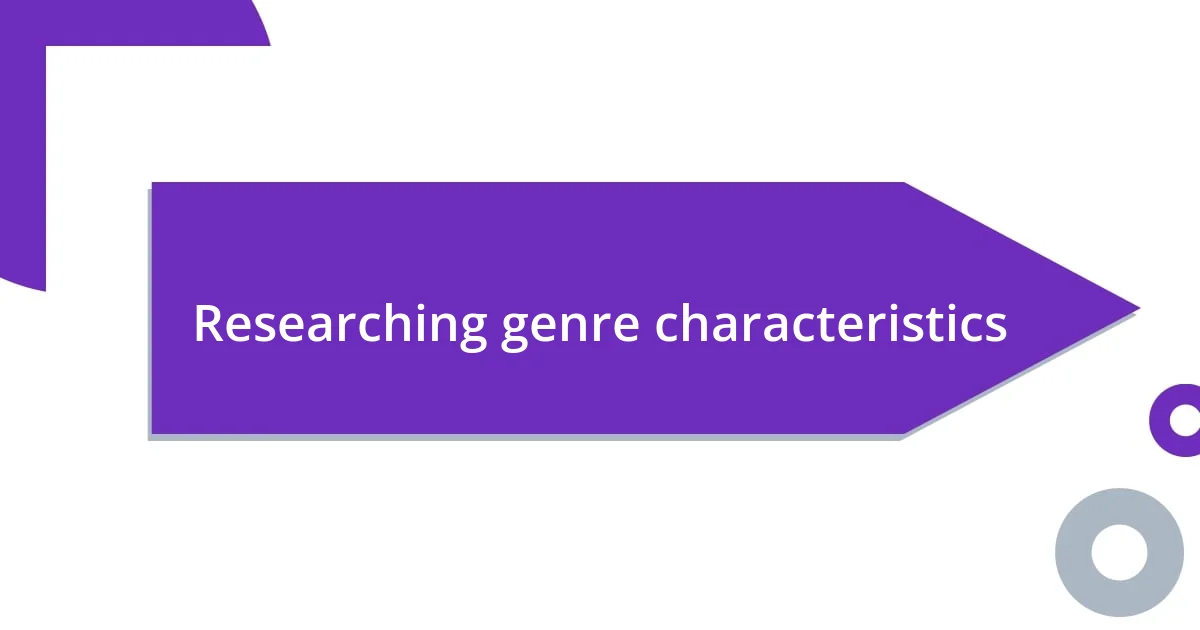
Researching genre characteristics
Researching genre characteristics is a fascinating adventure in itself. When I first decided to explore horror, I spent hours reading articles and reviews to understand its main attributes. I found that elements like suspense, fear, and the unknown create a thrilling atmosphere, sending chills down my spine. Have you ever noticed how specific characteristics, like unreliable narrators, can radically change a story’s dynamic? I certainly have, and it opened up a new layer of enjoyment for me.
Diving deep into genre conventions can also uncover hidden gems that resonate with personal experiences. For instance, when exploring young adult novels, I noticed recurring themes of self-discovery and the tumultuous journey of adolescence. It reminded me of my own teenage years, filled with identity exploration and emotional highs and lows. This connection made me appreciate the genre on a much deeper level, enriching my overall reading experience.
I often refer to genre characteristics as the building blocks of storytelling. A well-defined genre can set expectations while simultaneously offering a fresh take on familiar tropes. For example, romantic comedies are known for their light-hearted banter and happy endings, but when I stumbled upon a romantic dramedy that blended humor with genuine heartbreak, it both surprised and fascinated me. Isn’t it amazing how a slight twist on genre norms can lead to entirely new insights?
| Genre | Key Characteristics |
|---|---|
| Science Fiction | Futuristic settings, advanced technology, exploration of existential questions |
| Fantasy | Magical elements, mythical creatures, epic quests |
| Mystery | Unsolved puzzles, detective work, plot twists |
| Non-Fiction | Real events, factual information, analysis |
| Horror | Fear, tension, supernatural elements |
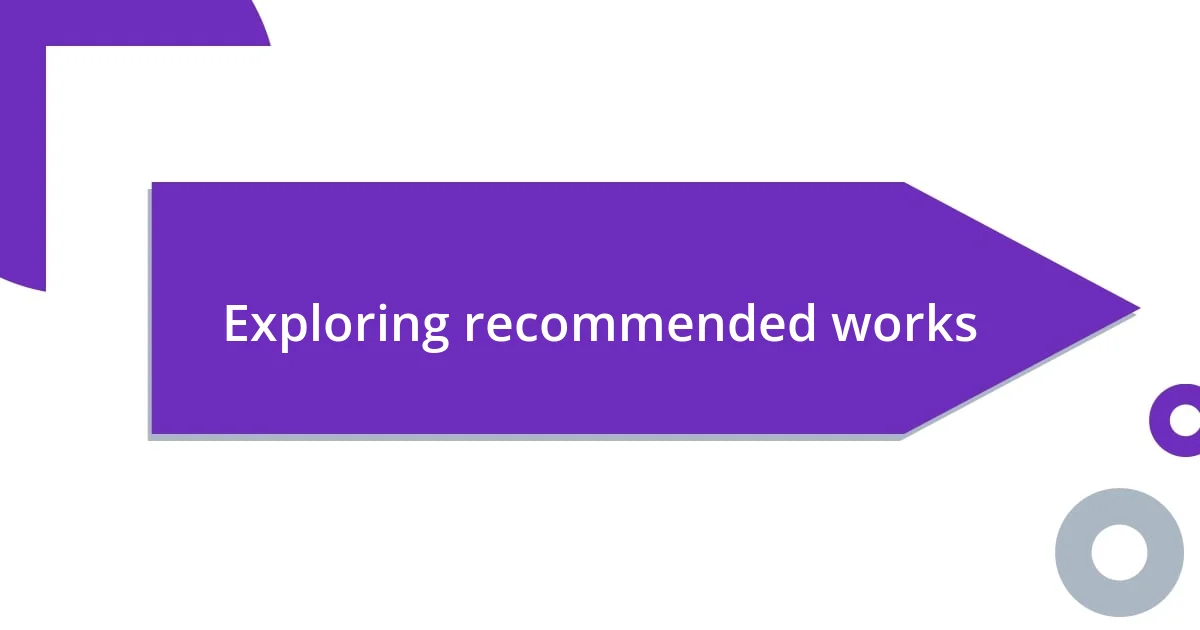
Exploring recommended works
When exploring recommended works within a new genre, I find it invaluable to listen to the voices of trusted friends and influencers. For instance, when I wanted to dive into magical realism, a colleague suggested “One Hundred Years of Solitude.” Their excitement for the novel made me curious. Have you ever felt intrigued simply by the passion others have for a book? That recommendation transformed my reading journey, revealing a blend of reality and fantasy that struck a chord deep inside me.
Another approach I enjoy is browsing curated lists of must-read titles in a genre. I remember scrolling through a blog dedicated to contemporary poetry, and I came across a collection by Mary Oliver. Her ability to capture the beauty of simple moments resonated with me. Each poem felt like a gentle reminder to appreciate life’s fleeting wonders. Isn’t it incredible how a single poem can make you pause and reflect?
Lastly, participating in online book clubs or reading challenges can also expose you to new recommendations tailored to your interests. Once, I joined a challenge that focused on debut authors, and I was introduced to a stunning novel by an emerging voice in literary fiction. The experience felt like unearthing a hidden treasure, and I realized that sometimes the most exciting discoveries come from collective enthusiasm and shared reading experiences. What new gems have you uncovered thanks to others’ recommendations?
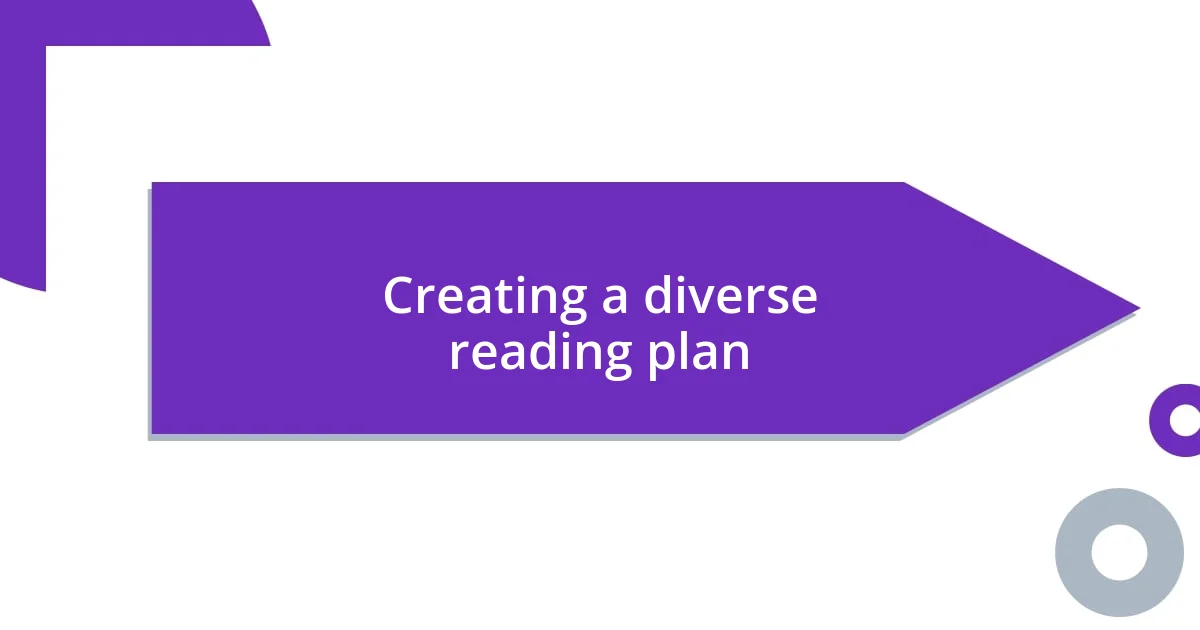
Creating a diverse reading plan
Creating a diverse reading plan can feel like an exhilarating puzzle to assemble. I remember when I decided to branch out from my cozy world of mysteries into science fiction. I created a list where I included titles from various genres, ensuring that each selection brought a different flavor to my reading experience. This intentional mix not only kept my literary palate stimulated but also introduced me to unique perspectives and ideas that I hadn’t encountered before.
One effective strategy I employ is to set a theme for each month, allowing myself to immerse deeply in a specific genre while still enjoying diverse voices. For example, during one month, I focused on memoirs from different cultural backgrounds, which opened my eyes to the richness of human experience across global narratives. Isn’t it fascinating how stories can bridge gaps in understanding? This approach turned reading into a journey, where each new book became a stop along a fascinating route of exploration.
Lastly, I find it crucial to leave room in my reading plan for spontaneity. Sometimes I stumble upon a book that calls my name, even if it doesn’t fit the predetermined categories I’ve established. When I picked up a graphic novel on a whim, I discovered the power of visual storytelling, broadening my appreciation for narrative forms. How often have you passed by a captivating book only to regret not giving it a chance? Embracing spontaneous reads keeps my plan fresh and exciting, turning each reading session into a delightful surprise.
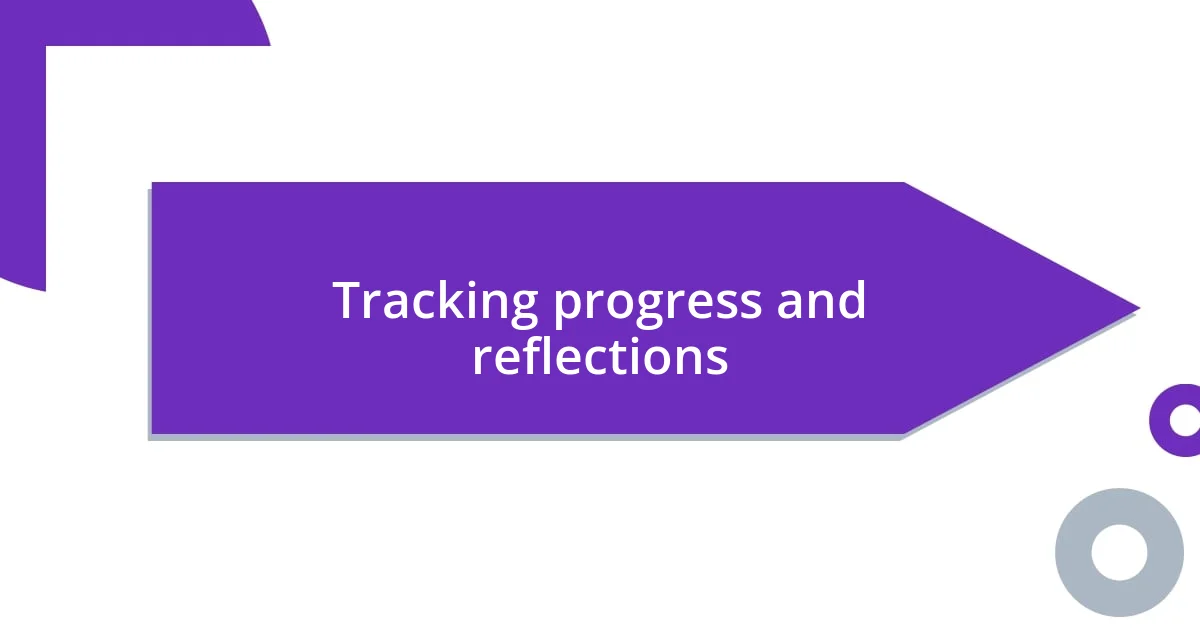
Tracking progress and reflections
Tracking my progress in exploring new genres is essential for growth and understanding. I like to maintain a reading journal, noting my thoughts and reactions after each book. Recently, after finishing a dystopian novel, I jotted down how it made me feel both anxious and reflective about today’s world. Have you ever captured such raw emotions after reading? This practice not only helps me process my experiences but also reveals patterns in my preferences over time.
Reflecting on my readings allows me to appreciate my journey through different genres. I often revisit my notes and notices changes in my tastes or new interests that emerge. For instance, after diving into a historical fiction novel, I found myself drawn to learning more about the era it depicted. Isn’t it interesting how a book can spark curiosity beyond its pages? This reflection enhances my literary experience, encouraging me to seek out related works and deepen my understanding.
I also encourage myself to set specific goals related to my genre exploration. For example, last year, I aimed to read at least five graphic novels, a format I was less familiar with. When I met that goal, I found not just satisfaction but a newfound appreciation for how visuals can complement storytelling. What goals have you set for yourself, and what did you learn from achieving them? Seeing my progress this way motivates me, pushing me to go further with my reading journey.
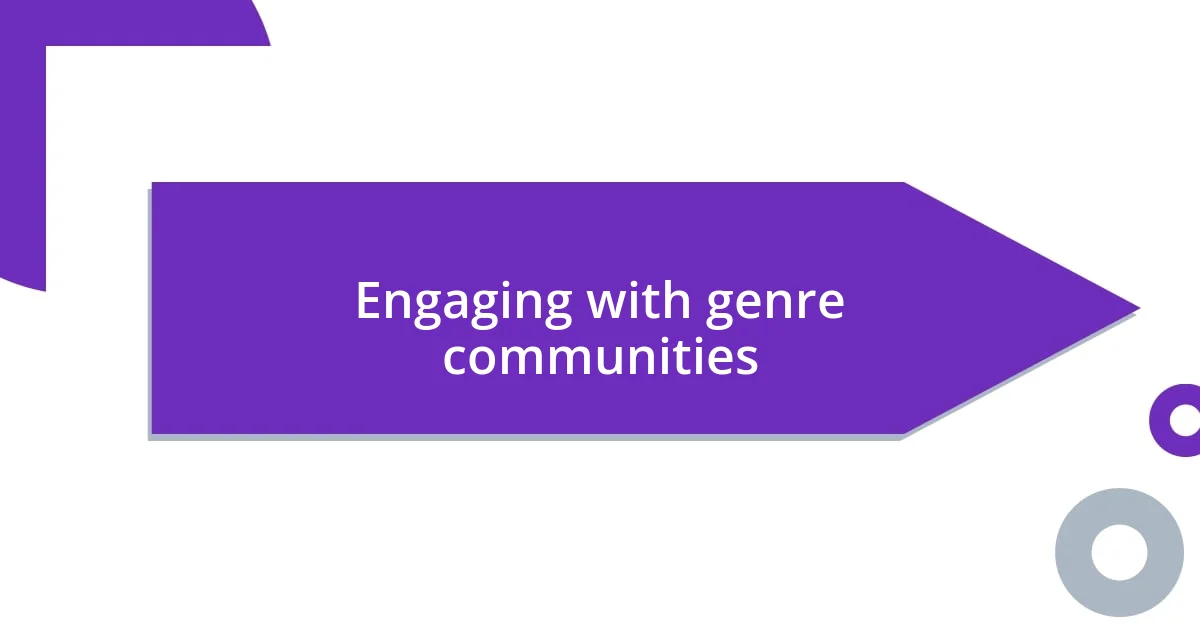
Engaging with genre communities
Finding my way into genre communities has been a game changer in my literary journey. I remember joining a fantasy book club where we discussed everything from classic high fantasy to contemporary urban tales. The insights I gained during these discussions were not only enlightening but also enriched my understanding of each genre’s nuances. Have you ever experienced that moment when a conversation opens your eyes to new interpretations? It’s like uncovering a hidden layer of an artwork.
Conversations in these communities often lead to unexpected recommendations. For instance, one member introduced me to a whimsical steampunk novel I might have overlooked. That book ignited my passion for the genre, expanding my reading beyond the confines of what I initially thought I liked. Isn’t it amazing how one suggestion can unravel a whole new pathway in your reading experience? Engaging with others creates a dynamic exchange that allows us to explore books we may never have discovered on our own.
I also find great value in online forums dedicated to genres I want to explore. Recently, I delved into a subreddit focused on horror literature, which was an eye-opener. The conversations were filled with diverse opinions and passions, and I picked up on themes that made me rethink my approach to scares in storytelling. How often do we underestimate the impact of community insights? Engaging in these spaces not only amplifies my understanding but also makes each genre feel like an invitation to a larger dialogue.






